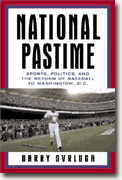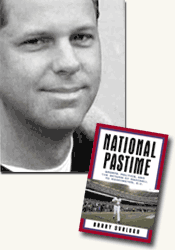An Interview with
Barry Svrluga
Interviewer Ram Subramanian: In the Acknowledgements of National Pastime, you indicate that you do not cover baseball in your regular job. What was your motivation for chronicling the Nationals’ inaugural season?
Barry Svrluga: No, that’s not the case. I said that I had been in only one major league press box for one major league game prior to the 2005 season, which is true. But when the team came to Washington from Montreal in September 2004, I was assigned to cover them for The Washington Post, where I arrived in 2003 to cover college basketball and football.
Once I started covering even the beginning of the story – with team executives landing in Washington and trying to figure out how to get their shop up and running – I was motivated to tell the whole tale from start to finish (or at least the finish of the inaugural season).
You capture very well the hundreds of little details that make a baseball season. How difficult was it for a non-baseball writer like you to get the zeitgeist of professional baseball?
Might be explained by the answer to the question above. As a lifelong baseball fan and follower of the game, and a career sports journalist, I know the sport and understand how to follow a team through everything it goes through – wins, losses, injuries, in-fighting, all of it. My background as a baseball fan was important, because the history of the game is revered and respected. But my professional experience – learning to tell tales from locker rooms and fields in the past – was more important. And when you’re in the clubhouse every day, when you’re around these guys as much as we are, you can’t help but get a sense of how they work.
To bring the human element to the narrative, you describe the feelings of two die-hard fans, Washington’s Alan Alper and Montreal’s Katie Hynes. How did you come across these two?
I met Alan Alper at the ceremony in which the club was re-named the Nationals, the one described in the book. I was covering it for the Post, and quoted him in my story that day. When I got the deal to do the book, I remembered him because he had been so emotional about the whole experience. I called him, and he was generous with his time over the course of the season.
I heard of Katie Hynes both from Alan and from media clips in Montreal. She is so passionate about the Expos and baseball in Montreal that she had been interviewed many times on the subject, and seemed to be a perfect fit to embody the Montreal section of the book. She cries almost every time she speaks of the Expos, and I thought it was important to make sure Montreal was included in the book, because its fans were in the same position as Washington’s were back in 1971.
 In the book, more than two-thirds of the pages are devoted to the antecedents of the team and their on-field performance up until the All Star break. Was it a deliberate move on your part to structure it this way, considering that the euphoria of the season’s early success trailed off as the team failed to make the post-season?
In the book, more than two-thirds of the pages are devoted to the antecedents of the team and their on-field performance up until the All Star break. Was it a deliberate move on your part to structure it this way, considering that the euphoria of the season’s early success trailed off as the team failed to make the post-season?
I wanted to make sure that this was different than just a “season inside”-type sports book, because there were so many facets to the story that were unique to this team, this city and this situation. No major professional sports team in the U.S. has ever had its operation run out of double-wide trailers in a parking lot for so long. When people pick up this book in five or 10 years, I think they’ll be more interested in the crazy run-up to the season – and the story of how baseball returned to the District – than they will be in the actual games, as compelling as they were. That’s what makes this story different, and I thought it was important to at least tilt the balance that way. I think it prevents the reader from getting midway through the book and saying, “We’re only in July?” Rather, the reader gets to the mid-point of the book and says, “The season’s just starting,” so there’s a lot to look forward to.
Obviously, several players (Jose Guillen, Chad Cordero, for instance) gave you considerable time talking about their experiences. This enriches the book considerably. Also, at times, you seem to have been the proverbial “fly on the wall,” privy to team meetings, coaches discussions, etc. Was it difficult to elicit this kind of support?
As the beat writer, part of my job is to get players to know me and trust me. It’s up to each player to draw his own conclusion, but it’s my job to establish relationships with them and, hopefully, get them to understand that I’ll treat them fairly – in print and in person – even when the news is not so good.
I had the good fortune to work with a clubhouse that was full of accommodating people, from Guillen and Cordero to Brian Schneider and Livan Hernandez. Even other characters who don’t appear as much in the book – Jamey Carroll, Nick Johnson, Gary Bennett, Joey Eischen – helped me understand how teams work, how baseball players prepare, how everyone deals with the highs of winning and the lows of losing.
In terms of team meetings, it is my job, both as the beat writer and an author, to give readers an idea of how decisions are made, what conflicts arise and how they’re diffused. If there was a team meeting, I went to several sources to try to re-create the moment. Sometimes, that works. Other times, players prefer to keep the moment private, and I’m left with little detail. But I think moments like that are as important as anything that occurs on the field, and there’s no question they enrich the reporting – and the book.
What explains the on-field success of the Nationals in 2005, considering that the players were not highly sought-after superstars? Was it Frank Robinson’s leadership, or Jim Bowden’s trades?
I don’t think you can discount the mere fact that the team was in Washington, that it played in front of crowds that averaged 33,000 a night, and that it felt wanted. These players had been through hell in Montreal, not because of the city, but because MLB owned the team and abused the players, sending them to Puerto Rico for “home games” and putting them on excruciatingly long road trips. Even though the situation remained inherently unstable – no one knew how long Tavares, Bowden or Robinson would be around – there was a freshness about their surroundings, a sense that they were a real team that people wanted. That, more than Bowden’s deals or Robinson’s leadership, played a role in the astounding first half.
What are your future writing plans? Any more baseball books?
I will cover this team for the Post through the 2007 season, and then help the new beat writer with the transition in early 2008 before going to the Beijing Olympics in August 2008. After that, it’s up in the air. I could remain in sports or move outside. And yes, I would like to do another book – whether it be on baseball or another subject – but in a different situation. Perhaps the biggest challenge of writing National Pastime was doing it as I covered the beat for the Post. That’s a job that requires 10-12-hour days almost every day (I had more bylines in the Post than anyone else during 2005), which left me only a few hours in the morning to work on the book. In the future, if I work on another book, I’d like to be able to devote all of my focus toward that project.
Barry Svrluga is a sports writer at the Washington Post and has written about sports for ten years for newspapers in New York, Maine, and North Carolina. He lives in Washington, D.C.
Contributing reviewer Ram Subramanian interviewed
Barry Svrluga, author of National Pastime: Sports, Politics, and the Return of Baseball to Washington, D.C. (see accompanying review), about his book via email for curledup.com. Ram Subramanian/2006.


